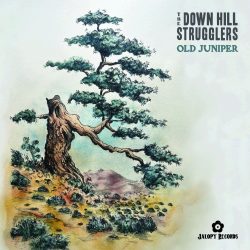Classic sound reworked in release of new old-time music.
 There is a constant current of old-time sounds that flows through Americana. It sometimes rises to the surface like it did with the inclusion of Ralph Stanley in the soundtrack of ‘Brother Where Art Though?’ in 2000, but it never really fades away. These are the songs that provided the music for country dances and urban funerals, played on instruments that travelled easily like harmonicas or concertinas and echoed the sounds carried in immigrant hearts from distant homelands played on fiddles and banjos.
There is a constant current of old-time sounds that flows through Americana. It sometimes rises to the surface like it did with the inclusion of Ralph Stanley in the soundtrack of ‘Brother Where Art Though?’ in 2000, but it never really fades away. These are the songs that provided the music for country dances and urban funerals, played on instruments that travelled easily like harmonicas or concertinas and echoed the sounds carried in immigrant hearts from distant homelands played on fiddles and banjos.
There are musicians who play the old songs note for note, exactly like the original recordings made by or Ralph Peer or John and Allen Lomax. There are others who are able to use them as a jumping-off point to go in their own direction. And then there are the Down Hill Strugglers, who stay firmly within the old-time folk tradition, while writing lyrics based on today’s experiences.
While “Old Juniper” is their first record featuring original compositions, there are hardly newcomers on the traditional music scene. They are the next link in the chain of traditional music having direct connections to some of the principals of the mid-century folk revival. Eli Smith, and Walker Shepard met at the home of Peter Stampfel of The Holy Modal Rounders where they also met John Cohen of The New Lost City Ramblers, two of the most influential groups in the Greenwich Village folk scene the exploded in the late 1950s and early 60s. Smith and Shepard joined up with Craig Judleman in 2008 to form the Dust Busters, focusing on the musical traditions of Appalachia, the Deep South and the Western States. Judelman left in 2012 and when Jackson Lynch joined the group changed their name to the Down Hill Strugglers.
While the Strugglers have released seven previous albums, “Old Juniper” is their first record featuring original compositions. The instrumentals, (‘Battle Hollow’, ‘Pillow Stone’, ‘Grayling Waltz’, ‘Old Juniper’, and ‘Old Phone Died’) showcase the group’s virtuosity. Their principal instruments are fiddle, guitar and banjo, what you might call the holy trinity of traditional folk music. But they also throw in a bit harmonica, some banjo-mandolin, a touch of lapsteel and even some cello from Hannah Shepard.
The Strugglers’ vocals are as accomplished as their instrumental ability, though at times they sound a bit like they are trying to mirror the recordings of a century ago rather than natural voices. Overall though they sing well together; harmonizing, playing off of each other as they take turns singing lead. Their vocals go hand in glove with the instruments to create music to rival the best of the string bands in the 1920s and 30s with a freshness that reflects influences of the intervening century.
The Strugglers’ lyrics adapt the form to the times. “Let the Poor Man Live and Rich Go Bust” with its reference to Jamie Dimon, is as relevant to today’s situation as Dave McCarn’s “Poor Man, Rich Man “was in 1930. These songs of lost love, longing, and pastoral images would not have been out of place in an 1890’s string band’s repertoire yet the wording and images are as fresh as today’s sunrise. This music isn’t preservation; it is continuation. It ensures that the form stays alive and current.


